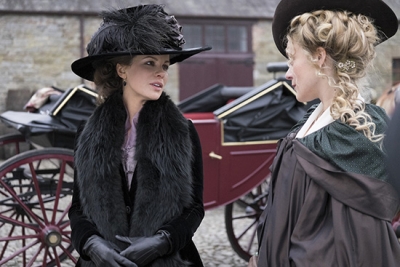Film
'Ihave no money and no husband,' comments Lady Susan Vernon (Kate Beckinsale) in Love and Friendship, Whit Stillman's adaptation of Jane Austen's novella, Lady Susan. The dilemma is common both to Austen's heroines and to this American director's: his five films have charted the ...
... (read more)Afilm sequel is always a risky venture, and thus it is with Goldstone, Ivan Sen's follow-up to his 2013 outback crime drama, Mystery Road. But it is just one risk the writer–director–cinematographer director takes with this film. Goldstone re-introduces us to the indigenous police detective ...
... (read more)French writer-director Stéphane Brizé's The Measure of a Man (La loi du marché), looks at first to be a character study with a quasi-documentary feel, then takes a disconcerting turn. At its centre is Vincent Lindon (Welcome [2009], Mademoiselle Chambon [2009]), a robust, often demonstrative actor ...
... (read more)At the end of Richard Linklater's 1970s coming-of-age comedy Dazed and Confused (1993), an inebriated teenager encourages her peers to be optimistic: 'Maybe the 80s will be radical, you know?' Twenty-three years later, Linklater has provided a response to this suggestion with the film's ...
... (read more)After a ten-year gestation, actor Don Cheadle (Hotel Rwanda [2004], Crash [2004]) has realised his dream to produce a film on the legendary jazz musician Miles Davis. Cheadle who directs, co-writes, and plays the central role eschews the usual linear narrative in Miles Ahead and takes as his ...
... (read more)Queen of the Desert recreates the life and times of British colonial explorer, cartographer, writer, and eventually Foreign Office adviser, Gertrude Bell (Nicole Kidman), whose intimate knowledge of Bedouin culture played a key role in the re-mapping of the Middle East after the collapse of ...
... (read more)Scorsese, currently showing at the Australian Centre for the Moving Image in Melbourne, is not exactly the exhibition that is advertised, and that is a very good thing. Martin Scorsese's career has stretched over half a century and involves nearly sixty films. Yet anyone who has seen advance press ...
... (read more)As with London buses, one waits for ages for a film based on the life of that vocal phenomenon Florence Foster Jenkins (1868–1944), and then two arrive simultaneously. Add to the mix Maggie Smith's Miss Shepherd in The Lady in the Van and it seems to be open season on eccentric ladies of ...
... (read more)Ahandful of storylines recur in the family drama genre. The premise of an individual returning home, with a secret that threatens to disrupt the equilibrium of a family unit, after a period of self-imposed exile in order to fulfil filial obligations is well established, if not always predictable ...
... (read more)The Lady in the Van may be a great comic character, but she is one of the unlikelier Britons ever to earn a blue plaque in her honour. Yet one now adorns the façade of 23 Gloucester Crescent, the London address that she besieged for fifteen years. Alan Bennett – her landlord of sorts ...
... (read more)









